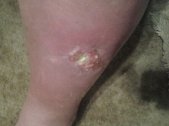Human Research on Propolis
Propolis for wound healing – chronic and hard to heal wounds

This was a grapefruit sized wound that was black with gangrene and infected. This picture is after 4 weeks of twice daily propolis salve
This site is amazing!!
Propolis for upper respiratory infections
Propolis for rhinopharyngitis – common cold
Propolis for Shingles
Propolis for ear infections – otitis media
Warts
Propolis for urinary tract infections
Gingivitis and Plaque
Periodontal infections
HPV
Radiotherapy induced mouth sores
Propolis assisted wound healing
Daily propolis to prevent recurring urinary tract infections
Propolis treats gram-positive bacteria
Improving antioxidant function in diabetic patients
Propolis and Endometriosis / Infertility
Bee Propolis May Improve Fertility in Women with Endometriosis
Women with endometriosis who have been unable to get pregnant may have a more successful outcome by taking bee propolis, according to a preliminary study in Fertility and Sterility (2003;80:S32). This is encouraging for the millions of women with endometriosis who are suffering from infertility.
Endometriosis is a disease where cells from the uterine lining become implanted within the pelvic cavity, causing adhesions, menstrual irregularities, painful periods, premenstrual syndrome, and infertility. Other conditions associated with endometriosis include migraine headaches and mitral valve prolapse. The diagnosis can be difficult, since surgery is the only way to accurately identify endometriosis. Studies suggest that 7 to 10% of all women in the United States have endometriosis. It is the third leading cause of gynecological hospitalization and the leading cause of hysterectomy. The cause of endometriosis is unknown, although a genetic link is likely. Surgical excision of the lesions and medications that suppress the production of estrogen and progesterone may provide temporary relief, but neither offers a cure.
In the new preliminary study, 40 women with mild endometriosis and primary infertility (i.e., they had never been pregnant) who had unsuccessfully tried to get pregnant for at least two years were assigned to receive 500 mg twice a day of bee propolis or placebo for nine months. The number of pregnancies was recorded during the treatment period.Women taking bee propolis had a significantly higher pregnancy rate than those taking the placebo. The number of women who became pregnant in the treatment and placebo groups was 60 and 20%, respectively. No adverse effects were reported by the women taking bee propolis.
Propolis is the resinous substance collected by bees from the leaves and bark of trees, especially poplar and conifer trees. Bees use propolis along with beeswax to construct their hives. Test tube studies, although preliminary, suggest that propolis may have strong anti-inflammatory effects. The pain associated with endometriosis is often due to the body’s inflammatory response to the endometrial lesions in the pelvic wall. Propolis may help decrease this inflammatory reaction, thereby reducing pain. It is unknown how propolis affects fertility.
Several studies suggest that oral propolis is useful in treating the common cold and intestinal parasites. Other studies have shown that topical propolis helps against genital herpes, cold sores, dental caries, periodontal disease, and rheumatoid arthritis.
Darin Ingels, ND, MT (ASCP), received his bachelor’s degree from Purdue University and his Doctorate of Naturopathic Medicine from Bastyr University in Kenmore, WA. Dr. Ingels is the author of The Natural Pharmacist: Lowering Cholesterol (Prima, 1999) and Natural Treatments for High Cholesterol (Prima, 2000). He currently is in private practice at New England Family Health Associates located in Southport, CT, where he specializes in environmental medicine and allergies. Dr. Ingels is a regular contributor to Healthnotes and Healthnotes Newswire.
Copyright © 2003 Healthnotes, Inc. All rights reserved. Republication or redistribution of the Healthnotes® content is expressly prohibited without the prior written consent of Healthnotes, Inc. Healthnotes Newswire is for educational or informational purposes only, and is not intended to diagnose or provide treatment for any condition. If you have any concerns about your own health, you should always consult with a healthcare professional. Healthnotes, Inc., shall not be liable for any errors or delays in the content, or for any actions taken in reliance thereon. Healthnotes and the Healthnotes logo are registered trademarks of Healthnotes, Inc.